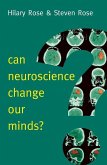Recent startling successes in machine intelligence using a technique called 'deep learning' seem to blur the line between human and machine as never before. Are computers on the cusp of becoming so intelligent that they will render humans obsolete? Harry Collins argues we are getting ahead of ourselves, caught up in images of a fantastical future dreamt up in fictional portrayals. The greater present danger is that we lose sight of the very real limitations of artificial intelligence and readily enslave ourselves to stupid computers: the 'Surrender'. By dissecting the intricacies of language use and meaning, Collins shows how far we have to go before we cannot distinguish between the social understanding of humans and computers. When the stakes are so high, we need to set the bar higher: to rethink 'intelligence' and recognize its inherent social basis. Only if machine learning succeeds on this count can we congratulate ourselves on having produced artificial intelligence.
Dieser Download kann aus rechtlichen Gründen nur mit Rechnungsadresse in D ausgeliefert werden.









